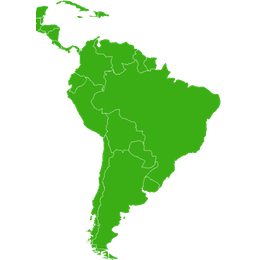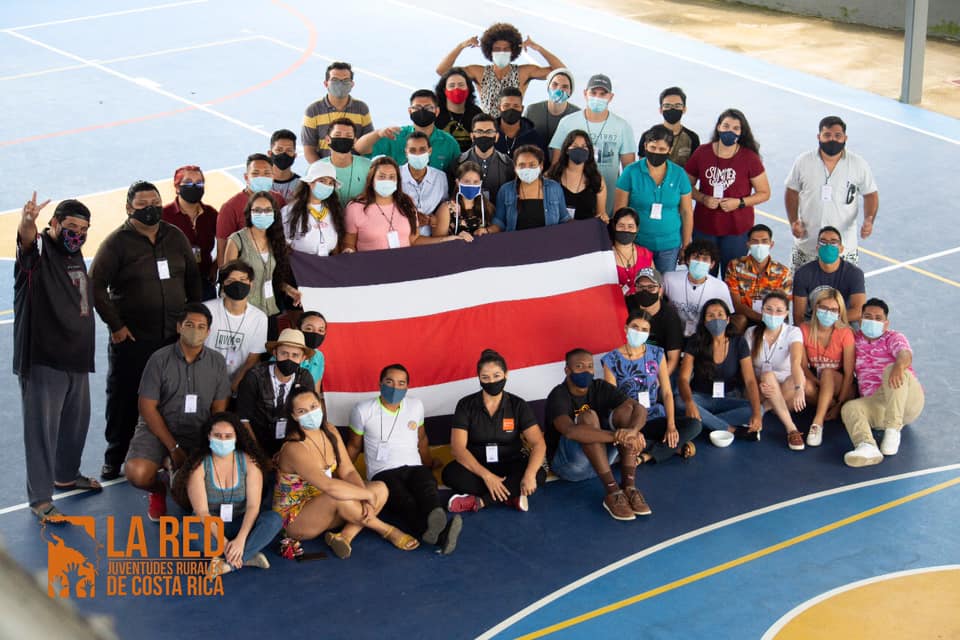Community-based capacity-building to enhance rural youth leadership and entrepreneurship in Costa Rica
"As rural youth we don’t have to leave our territories to thrive. What we must do is to work as a team to create opportunities that meet our expectations, our dreams."
Jose Abelino Arias, rural youth leadershipBACKGROUND
In Costa Rica, rural youth struggle to find attractive opportunities and access adequate resources to work in the agricultural sector. To overcome these challenges, a group of young rural entrepreneurs came together to fight for more opportunities for rural youth, such as bringing innovation to farms of their families or creating their own enterprises in the agribusiness sector.
WHAT’S INVOLVED
Training on leadership and entrepreneurship
Through knowledge exchange and capacity-building on leadership and entrepreneurship, rural youth can create opportunities to thrive in their own territories.
Institutional visibility
Rural youth have built a platform through which they can make their voices heard by decision makers at all levels.
EXPLORE THIS SOLUTION
The solution can offer:
- Business and life opportunities for rural youth
- A platform for rural youth to be political actors in driving sustainable development

Countries involved
Costa Rica
Project partners
PROCASUR, IFAD, FAO, IICA
Project dates
2016 – 2021
Share this solution
Bookmark this solution
BookmarkShow Full Solution
Summary
In Costa Rica, young people from rural areas struggle to find attractive employment opportunities and access adequate resources to work in the agricultural sector. To overcome these challenges, a group of young rural entrepreneurs came together to fight for more opportunities for rural youth, such as bringing innovation to their families’ farms or creating their own businesses in the agrifood sector.
Challenge/Problem
According to the II National Youth Survey, Costa Rica has 4,900,000 inhabitants, of which 1,795,772 are young people. Youth represent around 36 per cent of the total population of the country and 30 per cent of the population in rural areas (that is, 538,732 young people). Even though the survey does not provide detailed data on the socioeconomic statuses and demographics of rural youth in the country, the survey shows that there has been a significant reduction in the young population living in rural areas, since in 2008 they represented 49.5 per cent of the rural population.
According to a study conducted by the Central American Agriculture Council, in 2015 the poverty and unemployment levels among youth were greater than the national average. Data from II National Youth Survey has confirmed that the decline in the rural youth population is largely due to their migration to urban areas in search of better living conditions and greater opportunities for work and study. If these trends continue, Costa Rica’s rural sector (one of the most important sectors in the national economy) will soon face challenges in terms of work force availability and the preservation of sociocultural identity and practices.
Solution
A group of young entrepreneurs from rural areas of Costa Rica, unhappy with the prospects for the future that their own communities had to offer and unwilling to migrate to big urban centers, came together to form La Red Nacional de Juventudes Rurales de Costa Rica. Part of a broader “network of networks”, with chapters in Guatemala, Honduras and El Salvador, the La Red Costa Rica has the ultimate goal of helping young workers to cooperate and articulate in face of the lack of work opportunities, by promoting horizontal, peer-to-peer capacity-building.
La Red, meaning “the network” in Spanish, adopts a three-steps work strategy: (i) understanding the current socioeconomic conditions and connection potentials in rural territories (what they call “problematization”); (ii) identifying good practices and rural solutions that have been developed in each region, community and family to share them with among themselves; and (iii) promote the uptake of good practices, which catalyzes the cooperation process and the participation of rural youth with their work and specialized services (what they call “incorporation”).
The solution includes a policy dialogue platform, through which rural youth entrepreneurs can articulate and channel their demands to make their voices heard by decisionmakers at the national, regional and global level. The platform members have a permanent position to share their challenges and perspectives regarding rural development. They are also constantly looking for opportunities to work in the public arena and engage decision makers in order to be an integral part of the decision-making process.
The solution also includes a social platform for knowledge exchange through which la Red has developed a series of context-relevant training and learning materials to better prepare rural youth for entrepreneurship. Among other topics, the network facilitates capacity-building for sustainable rural development, financial education, funding opportunities, access to credit and markets, strategic planning and business management.
Several social technologies are also adopted by La Red to create a horizontal and democratic process of rural development across Costa Rica. The organization deploys community observers (“observadores comunitarios”, in Spanish), which follow closely some communities to understand first-hand their most pressing issues. They also promote groups spaces and communities of practices for youth that wish to explore specific areas: Coffee Afternoons, to engage in political discussions; Abya Yala, to strengthen the traditional knowledge of native peoples; Communicate to Transform, to explore ICTs in rural development; and Entrepreneurship Festival, to connect agripreneurs with rural innovations.
The focus, strategic priorities and capacity-building topics are determined though a participative assessment of needs and opportunities. La Red works closely with the support of international and national partners, like PROCASUR. Based on the agreed priorities, La Red mobilizes different members to share their experiences in their activities, form academia, government, social movements and international organizations like IFAD, FAO and the Inter-American Institute for Cooperation on Agriculture (IICA), to facilitate and contribute to technical collaboration and knowledge-sharing among its members.
Results
-Political mobilization on rural families for the adoption of legal and institutional frameworks at that acknowledge rural youth and call upon all the relevant stakeholder to work with them
-Sociocultural identities and practices, especially of native communities, celebrated and preserved between through cultural, artistic, and sporting events
-Inclusion of gender, race and LGBTQI+ propositions in the rural development agenda and empowerement of local minorities in rural areas
-Organization of two National Conferences of Rural Youth of Costa Rica (2019 and 2020) with hundreds of participating youth
-Mobilization of over 120 rural youth, community leaders and agripreneurs in the network in all departments of Costa Rica
-Mobilization of 3,900 rural youth in capacity-building activities under the scope of the Central American “network of networks”
-Establishment of 9 subnational networks of rural youth in Costa Rica
Lessons Learned/Potential for replication
The first lesson is that institutional structure matters. Although the solution is based on the horizontal collaboration of young rural entrepreneurs, having a small secretariat with institutional support from public and private actors to maintain member engagement was critical for the success of the solution.
Secondly, members’ policy and advocacy work was also an important part of making the forum relevant for national and local policy-making. It also kept members motivated to engage in dialogue and promote high-level and grassroots change.
Next Steps
Digital exclusion is still a major challenge for rural youth in Costa Rica, so the pandemic has been a major obstacle for the network and forum to maintain their activities, especially in engaging the most marginalized rural youth.
In this sense, the main priorities are to increase rural youth’s access (and the quality of access) to information and communications technologies (ICTs) and adapt the ways the network and forum work to the new realities created by the pandemic.
Last update: 05/01/2023


